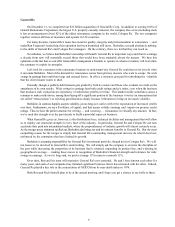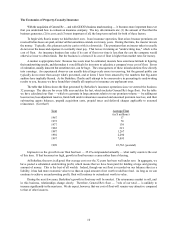Berkshire Hathaway 1998 Annual Report Download - page 17
Download and view the complete annual report
Please find page 17 of the 1998 Berkshire Hathaway annual report below. You can navigate through the pages in the report by either clicking on the pages listed below, or by using the keyword search tool below to find specific information within the annual report.16
to third-class tactics. CEOs understandably do not find it easy to reject auditor-blessed strategies that lead to
increased future “earnings.”
An example from the property-casualty insurance industry will illuminate the possibilities. When a p-c
company is acquired, the buyer sometimes simultaneously increases its loss reserves, often substantially. This boost
may merely reflect the previous inadequacy of reserves — though it is uncanny how often an actuarial “revelation”
of this kind coincides with the inking of a deal. In any case, the move sets up the possibility of ‘earnings”
flowing into income at some later date, as reserves are released.
Berkshire has kept entirely clear of these practices: If we are to disappoint you, we would rather it be with
our earnings than with our accounting. In all of our acquisitions, we have left the loss reserve figures exactly
as we found them. After all, we have consistently joined with insurance managers knowledgeable about their
business and honest in their financial reporting. When deals occur in which liabilities are increased immediately
and substantially, simple logic says that at least one of those virtues must have been lacking — or, alternatively,
that the acquirer is laying the groundwork for future infusions of “earnings.”
Here’s a true story that illustrates an all-too-common view in corporate America. The CEOs of two large
banks, one of them a man who’d made many acquisitions, were involved not long ago in a friendly merge r
discussion (which in the end didn’t produce a deal). The veteran acquirer was expounding on the merits of the
possible combination, only to be skeptically interrupted by the other CEO: “But won’t that mean a huge charge,”
he asked, “perhaps as much as $1 billion?” The “sophisticate” wasted no words: “We’ll make it bigger than that
— that’s why we’re doing the deal.”
A preliminary tally by R. G. Associates, of Baltimore, of special charges taken or announced during 1998
— that is, charges for restructuring, in-process R&D, merger-related items, and write-downs — identified no less
than 1,369 of these, totaling $72.1 billion. That is a staggering amount as evidenced by this bit of perspective:
The 1997 earnings of the 500 companies in Fortune’s famous list totaled $324 billion.
Clearly the attitude of disrespect that many executives have today for accurate reporting is a business
disgrace. And auditors, as we have already suggested, have done little on the positive side. Though auditors
should regard the investing public as their client, they tend to kowtow instead to the managers who choose them
and dole out their pay. (“Whose bread I eat, his song I sing.”)
A big piece of news, however, is that the SEC, led by its chairman, Arthur Levitt, seems determined to get
corporate America to clean up its act. In a landmark speech last September, Levitt called for an end to “earnings
management.” He correctly observed, “Too many corporate managers, auditors and analysts are participants in
a game of nods and winks.” And then he laid on a real indictment: “Managing may be giving way to
manipulating; integrity may be losing out to illusion.”
I urge you to read the Chairman’s speech (you can find it on the Internet at www.sec.gov) and to support
him in his efforts to get corporate America to deliver a straight story to its owners. Levitt’s job will b e
Herculean, but it is hard to think of another more important for him to take on.
Reports to Shareholders
Berkshire’s Internet site, www.berkshir ehathaway.com, has become a prime source for information about the
company. While we continue to send an annual report to all shareholders, we now send quarterlies only to those
who request them, letting others read these at our site. In this report, we again enclose a card that can be
returned by those wanting to get printed quarterlies in 1999.
Charlie and I have two simple goals in reporting: 1) We want to give you the information that we would
wish you to give us if our positions were reversed; and 2) We want to make Berkshire’s information accessible
to all of you simultaneously. Our ability to reach that second goal is greatly helped by the Internet.
In another portion of his September speech, Arthur Levitt deplored what he called “selective disclosure.”
His remarks were timely: Today, many companies matter-of-factly favor Wall Street analysts and institutional
























